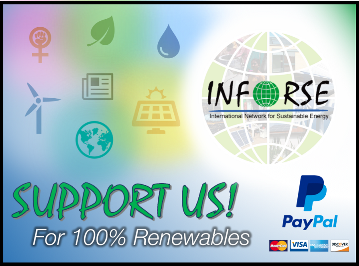|
|
|
|
|
|
|
|
|
|
|
|
|
|
|
|
|
|
|
|
|
| Follow Us: |
| Barbados Employs the Sun to Heat Water | |
|
Over 31,000 solar water heaters are installed in homes, businesses, and hotels in Barbados; about 100,000 are in use in Puerto Rico. The payback periods range from 1.5 to 5 years in most Caribbean countries. By Oliver Headley, Prof. Director, Centre for Resource Management and Environmental Studies (CERMES), University of the West Indies, Barbados |
|
| Barbados Pioneers | |
|
The solar water heater industry of Barbados is the best known example of the exploitation of a renewable-energy technology in the Caribbean. The two pioneers of this industry in the 1970s were Mr James Husbands of Solar Dynamics and Mr Peter Hoyos of SunPower. The Barbados solar water-heater industry benefited from the competition between the two dominant companies, which control about 90% of the market. A crucial factor in creating the market was the provision of fiscal incentives by the Barbados government under the leadership of (then) Prime Minister Tom Adams. A householder could apply the cost of his water heater against his income tax for the year. The success was remarkable: 23,388 solar water heaters were installed in Barbados over the period from 1974 through 1992, and the solar companies presently employ 130 people. Another measure to promote solar water heaters was the provision of training programs particularly aimed at architects to encourage owners to include solar hot-water systems in new buildings and in retrofitting old buildings. |
|
| Economic Bonus for Household and Country | |
|
Presently, solar water heaters are quite attractive to users. With an electricity consumption for hot water of 4000 kWh per year, two years’ consumption by a consumer who is using an electric water heater, including an initial cost of US $500, costs the same as that of a consumer with a solar water heater, including an initial cost of US $1500. After this period, the solar water heater saves the consumer US $520 per year. For tourism, which is now the biggest industry in the region, hot water is essential, and solar water heaters are even more cost-effective for this industry than for households. In terms of avoided imports of fossil energy, the solar water heaters reduce annual imports by 33,000 tonnes of fuel, a saving of about $6.5 million US if one assumes a price of $25 US per barrel. These are the savings that the solar water heater industry achieves for Barbados, with its population of about 260,000. If solar water heating were applied over all the territories of the anglophone Caribbean, with a population of 5 million, to the same extent as in Barbados, savings would be $125 million US per year. Any payback period greater than 3 years for a household and 4 years for a hotel is likely to discourage the use of solar water heaters. On islands where cheap LPG is the alternative fuel, the economics are not so persuasive, as the below graph shows. |
|
| Figure | |
|
Typical intervals of simple pay-back periods for solar water heaters on 10 Caribbean islands. For each island: - The blue bar shows pay-back (break-even) periods for replacing an electric water heater - The yellow bar is for replacing LPG (Propane/Butane gas) water heater. The quickest payback (left end of bar) is for a hotel using 137,000 kWh/year for hot water, while the right end of the bar is for a family using 4,000 kWh/year. It shows that the criteria of 3-4 years pay-back can be fulfilled when replacing electric water heaters, but on many islands not when replacing gas for households. Other main assumptions of chart: - Water is heated from 25°C to 65°C. - The capital cost of a household solar water heater is US $1,800. - The capital cost of a hotel solar water heater is be US $40,000. Photo text:: - Solar water heater from Solar Dynamics, Barbados. Photo by Oliver Headley. - The Barbados solar industry also installs PV electric systems. On the above photo, is the largest PV system in Barbados, which runs the lights at Harrison’s Cave, the island’s most popular tourist attraction. |
|
| Oliver Headley, more information | |
|
Oliver Headley, Prof., and Director of CERMES holds PhD of Chemistry. He finished universities in Jamaica and UK. He has been working with solar energy since 1969. He got several awards for his scientific achievements e.g., Guinness Award ’82 and Gold Medal from the Amir of Bahrain in 1996. More Information: Oliver Headley, Centre for Resource Management and Environmental Studies (CERMES), University of the West Indies, Cave Hill Campus,PO Box 64, Bridgetown, Barbados. Ph: 246 417 4339 or 246 417 4316, fax: 246 424 4204, e-mail: oheadley@hotmail.com |
|

| |
| Published in Sustainable Energy News |
|
|
Go back to main page of ISSUE #30 (683KB) 18 pages (2000-08-11) |
|
| Contact | |
| |
INFORSE Secretariat Klosterport 4F, 1. floor DK-8000 Aarhus C Denmark Phone: +45 86 22 70 00 Twitter: INFORSE_org Facebook: INFORSE Web: inforse.org E-mail: ove@inforse.org |
